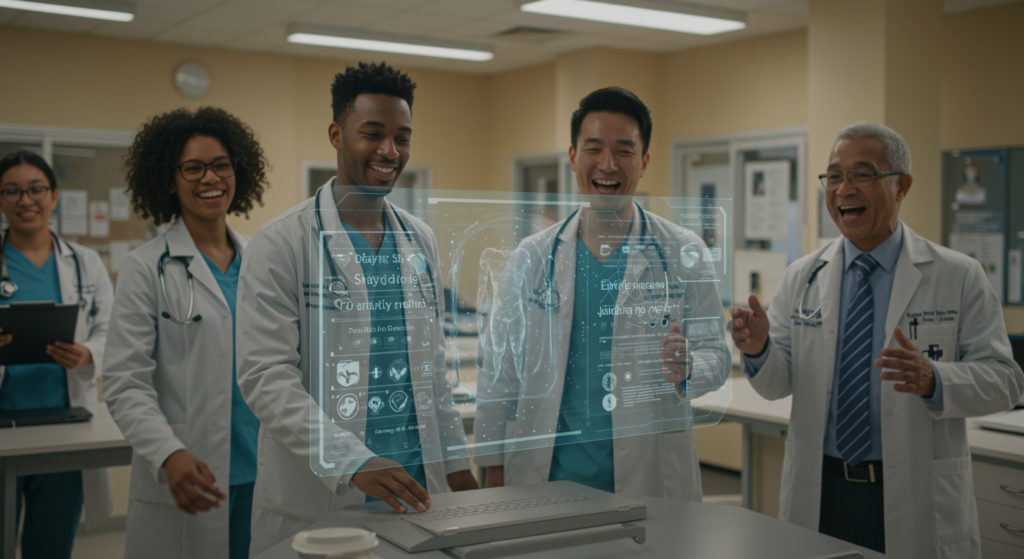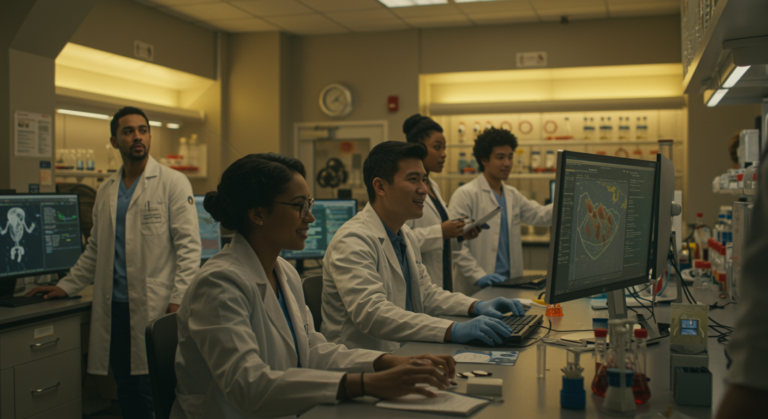
AI Transforming Medicine: 4 Revolutionary Ways Revealed
Artificial intelligence is making waves in the medical world, reshaping how we tackle health challenges and improve lives. As AI in healthcare integrates into daily practices, it’s not just about tech—it’s about saving time, reducing errors, and delivering better care to patients everywhere. Let’s explore four key ways this transformation is unfolding, starting with its role in spotting issues early and accurately.
Advanced Diagnostics: How AI in Healthcare Spots Issues Early
Imagine a world where doctors can detect diseases before symptoms even appear—that’s the promise of AI in healthcare today. Advanced diagnostics powered by AI analyze vast amounts of medical imaging, like X-rays and MRIs, with incredible speed and precision. For instance, AI algorithms can identify anomalies in scans that might be missed by the human eye, potentially catching cancers or heart conditions at their earliest stages.
This technology isn’t science fiction; it’s already in use. A study from Harvard found that AI in healthcare tools improved diagnostic accuracy by up to 30% in radiology (Harvard Gazette), allowing for quicker interventions that save lives. What if your next check-up used AI to flag risks you didn’t know you had? It’s a game-changer, making routine exams more reliable and less invasive.
Real-World Examples of AI in Healthcare Diagnostics
Take a hospital in Boston, for example, where AI systems review thousands of images daily, helping radiologists focus on the most critical cases. This not only speeds up diagnoses but also reduces fatigue-related errors. If you’re curious, how might this affect your own health journey? By embracing AI in healthcare, we’re moving toward a future where preventive care is the norm, not the exception.
Personalized Medicine: Tailoring Treatments with AI in Healthcare
One size doesn’t fit all when it comes to health, and that’s where AI in healthcare shines brightest. Personalized medicine uses AI to analyze genetic data, lifestyle factors, and past medical history to create customized treatment plans. This means treatments that work specifically for you, minimizing side effects and boosting effectiveness.
Think about cancer therapy: AI algorithms can predict how a patient might respond to certain drugs based on their unique biology. According to research from the World Economic Forum, AI in healthcare is enabling more targeted therapies, potentially improving survival rates by 20-30% (WEF Report). It’s like having a personal health coach that never sleeps, adjusting strategies in real-time. Have you ever wished for a treatment plan as unique as your fingerprint? AI is making that a reality.
Actionable Tips for Embracing AI in Healthcare Personalization
To get the most out of this, start by discussing genetic testing with your doctor—it could unlock AI-driven insights into your care. For everyday users, apps that incorporate AI in healthcare can track habits and suggest tweaks, like dietary changes based on your data. This approach not only empowers patients but also fosters a more collaborative relationship with healthcare providers.
Streamlining Clinical Workflows: The Efficiency Boost from AI in Healthcare
Hospitals are busy places, and AI in healthcare is stepping in to make things run smoother. By automating administrative tasks, AI frees up doctors and nurses to focus on what matters most: patient interaction. Electronic health records, for example, can be managed with AI that predicts and organizes data, cutting down on paperwork and reducing errors.
A report from the American Academy of Physician Assistants highlights how AI in healthcare optimizes workflows, potentially saving clinicians hours each week (AAPA News). Picture this: A nurse uses AI to quickly access a patient’s full history during an emergency, making decisions faster and more accurately. Isn’t it reassuring to know that AI can handle the backend so professionals can prioritize healing?
Practical Strategies to Implement AI in Healthcare Workflows
If you’re in healthcare, consider piloting AI tools for scheduling or data analysis to see immediate benefits. For patients, this means shorter wait times and more attentive care. By integrating AI in healthcare thoughtfully, facilities can reduce burnout and enhance overall satisfaction for everyone involved.
Predictive Analytics: Forecasting Health Trends with AI in Healthcare
AI in healthcare isn’t just about reacting—it’s about predicting what’s coming next. Predictive analytics uses machine learning to forecast outbreaks, patient deteriorations, or even chronic disease progression. By crunching data from wearables, electronic records, and population health stats, AI can alert systems to potential issues before they escalate.
For instance, during the COVID-19 pandemic, AI models helped predict hotspots and resource needs, as noted in a NCBI study (PMC Article). This proactive approach could prevent hospitalizations and save costs. What if your smartwatch warned you of an impending illness, giving you time to act? AI in healthcare is turning possibilities into everyday tools that promote wellness.
Benefits and Hypothetical Scenarios in AI in Healthcare Analytics
Envision a rural clinic using AI to monitor community health trends, intervening early in flu seasons. This not only protects individuals but also strengthens public health systems. To make it work for you, explore AI-powered apps that track vital signs and offer predictive advice—it’s a simple step toward staying ahead of health challenges.
Throughout these innovations, AI in healthcare is proving its worth by making medicine more accessible and equitable. From underserved areas to high-tech urban centers, the impact is profound, blending human expertise with intelligent systems. Remember, the goal is always better outcomes for patients, and AI is a powerful ally in that mission.
Wrapping Up: Why AI in Healthcare Matters and Next Steps
As we’ve seen, AI in healthcare is more than a trend—it’s a fundamental shift that’s improving lives daily. Whether it’s through early detection or personalized plans, these four ways are just the beginning. If you’re passionate about health tech, what are your thoughts on how AI could change your routine? Share in the comments, explore more on our site, or spread the word to help others stay informed.
We’d love to hear from you: Have you experienced AI in healthcare firsthand? Drop a note below, subscribe for updates, or check out related articles on emerging tech. Let’s keep the conversation going and embrace these advancements together.
References
- World Economic Forum. “AI Transforming Global Health.” WEF Report.
- Harvard Gazette. “How AI is Transforming Medicine and Healthcare.” Harvard Article.
- American Academy of Physician Assistants. “Revolutionizing Healthcare: The Transformative Power of AI.” AAPA News.
- PMC. “AI in Healthcare: Applications and Implications.” PMC Article.
- Michigan Tech University. “Five Ways AI Helps Healthcare.” MTU Resource.
AI in healthcare, medical AI applications, artificial intelligence medicine, AI diagnostic tools, healthcare transformation, personalized medicine AI, AI predictive analytics, clinical workflow AI, AI in diagnostics, healthcare AI innovations







